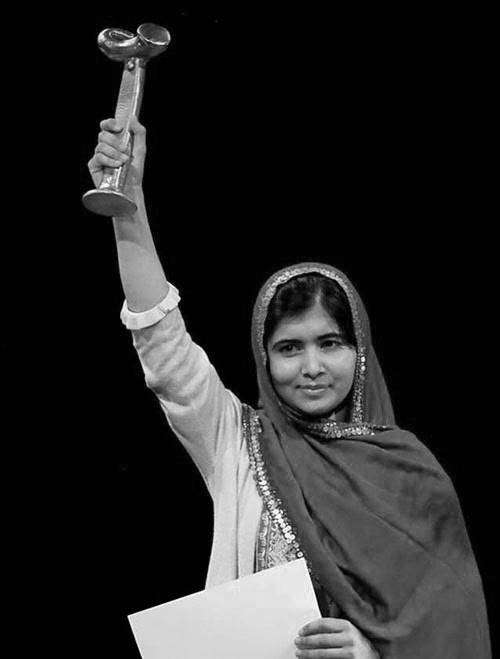Malala Yousafzai Named Nobel Peace Prize Laureate
February 2015
In 2014, the Nobel Peace Prize was awarded to Kailash Satyarthi and Malala Yousafzai. Alfred Nobel created the Nobel Peace Prize in 1895, an internationally recognized award. It is very difficult to receive the prize, as one must make a substantial and influential impact on worldwide peacebuilding to receive the award. Previous Nobel Peace Prize recipients have started or have been part of movements such as disarmament, anti-terrorism activism, establishments of organizations to promote peace and raise awareness about the lives of [today’s] slaves, and children’s and girls’ rights movements. Malala Yousafzai received the Nobel Peace Prize this past year because of her work in promoting girls’ education in Pakistan, despite the threats from the Taliban and the injuries she sustained as a result of those threats being carried out. When asked what she thought about Malala’s struggle against the Taliban, Hailey DiCindio ‘18 shared, “Malala’s bravery and perseverance are made clear through the fact that she spoke out against the Taliban after all she went through.” Malala began her fight for her right to receive education at a very young age, and because of her devotion to peace and equality, she is the youngest Nobel Peace Prize recipient in history.
Malala’s activism started when the Taliban came to the Swat Valley, where she was born and raised. The Taliban believe in harsh Islamic laws that often reduce women into nothing but property. The Taliban are against girls’ education, and they issued a death threat when Malala started speaking out against the oppression. At just eleven years old, Malala gave a speech in Peshawar, Pakistan about the Taliban denying her rights to an education. The following year, Malala began blogging for the BBC about the brutality of the Taliban’s occupation and the toll it takes on female citizens in particular.
Her story was then picked up by the New York Times for a short video documentary called Class Dismissed: Malala’s Story. The creator of the documentary was Adam Ellick, an alumnus from Wilmington Friends School who graduated in 1995. The documentary followed the story surrounding her education and her life living under the Taliban’s rule.
Malala’s father has a great influence on her, inspiring her to become involved in activism geared towards women’s rights and education at a young age. Ziauddin Yousafzai, her father, owned a chain of schools dedicated to education equality, one of which she attended. He delivered TED Talks, expressing his support for equal rights for women. It was eventually her father’s connections that led her to work with the BBC. The British news source had been in contact with her father in previous years and contacted him when they wanted to start a blog on the living conditions during the Taliban occupation. Ziauddin Yousafzai directed the BBC to his daughter, Malala, who gladly agreed to blog about what is was like to live underneath the Taliban’s iron fist. She used a pseudonym to protect her identity, but was revealed to be the blogger in December of that same year.
Malala’s activism did not go unnoticed by the Taliban and they issued a death threat to her. She learned about this threat in 2011, when she was only fourteen. She was not concerned for her own life, but for her father’s. The young activist feared that the Taliban would kill her father to force her stop, which would set an example for everyone about the consequences of speaking out against the Taliban. Unfortunately, the family was fearing for the wrong life.
On October 9, 2012, Malala was on her way home from school when a Taliban member boarded her bus and asked which one of the many children was Malala. All the children turned to face her, and before anyone could do anything, the intruder took out a gun and fired. The bullet entered the top of Malala’s skull and travelled down her neck. Two other girls were injured by following shots.
Luckily, Malala was saved by quick medical assistance from the Pakistani Government. They rushed her to the Peshawar military hospital where she regained enough health to be moved to Birmingham, England. After multiple successful surgeries, the doctors finally treated her injuries; however, they were serious enough to leave her with permanent brain damage. Through great perseverance, she was able to recover, and finally began school in Birmingham, England in March of 2013.
The shooting did not have the effect the Taliban had intended because it did not stop Malala or make her afraid to continue. The shooting did not silence her or the world; instead, it made her stronger and more certain of her beliefs and actions. Her life-changing experience gave her the publicity and the power to take her cause and her story to the world stage. The following year, on her sixteenth birthday, she gave a speech at the United Nations. She told her shocking story, and promoted education rights for girls and women around the world. Katy Shannon ‘17 remarked, “I think she is incredibly brave to do the work that she does in standing up for women against brutal organizations like the Taliban.”
Malala has been awarded many prizes for her work for girls’ education, before and after the shooting, but most recently, in October 2014, she was awarded the Nobel Peace Prize as a recognition of all she has done. Malala wrote an autobiography on her experience titled I Am Malala: The Girl Who Stood Up for Education and Was Shot by the Taliban.
The Taliban still consider her a threat, so Malala can not go back to Pakistan. However, she is refusing to be silenced and is using this opportunity to learn, grow, and spread her message throughout the world. If Malala’s campaign can succeed in getting better education for girls around the world, then that is one step towards equality between both men and women.



































